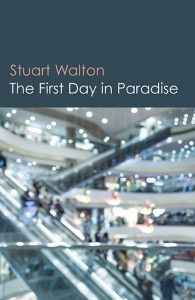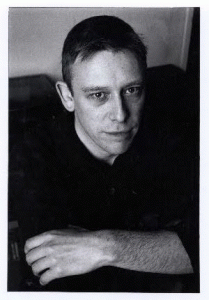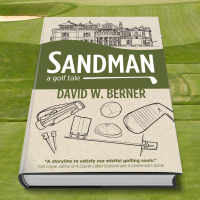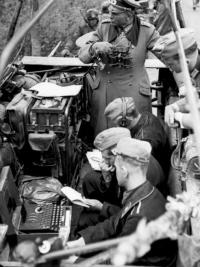
“My very earliest fictional influence was Alice, the most grown-up child in English literature, engaging in worldly Socratic disputation amid the variously hostile milieus down the rabbit-hole and through the looking-glass.”
Author Stuart Walton tells us about his early influences, his latest book and the perils of writing in bed.
 The First Day in Paradise is a story about the razzle-dazzle of contemporary consumer culture. It tells the tale of a young man called
Adam, whose options in life have been severely curtailed by a family tragedy, but who finds himself on a career path into which he has been beguiled almost in spite of himself. The standard critique
of consumerism, which began at the time of the emergence of the first department-stores and shopping arcades in London and Paris in the 19th century, is that it offers its customers a deceptive array
of choice, but that the choices it offers are ultimately meaningless – which lemon-squeezer to buy from the 15 on offer. Do people even need most of what the market is trying to make them buy?
The First Day in Paradise is a story about the razzle-dazzle of contemporary consumer culture. It tells the tale of a young man called
Adam, whose options in life have been severely curtailed by a family tragedy, but who finds himself on a career path into which he has been beguiled almost in spite of himself. The standard critique
of consumerism, which began at the time of the emergence of the first department-stores and shopping arcades in London and Paris in the 19th century, is that it offers its customers a deceptive array
of choice, but that the choices it offers are ultimately meaningless – which lemon-squeezer to buy from the 15 on offer. Do people even need most of what the market is trying to make them buy?
What the novel explores is how this culture sells itself, what inducements and enticements it dangles before not just consumers themselves, but to somebody who might cross the line and become an ever more integral part of it. A fundamental conflict develops between the kind of man his family wants Adam to be and the person he might become if he accepts the offers of advancement that are dangled before him by the consumer machine.
The machine itself is a gigantic shopping-mall that has elements of the Emerald City of Oz, Charlie's chocolate factory and Dante's Paradiso all smooshed together. It is a machine for generating a satirical focus on much of what is said and sold in the modern-day bazaar, but chiefly it's a profoundly ambiguous place, a scene of the kind of seduction that you fear to behold, even though you cannot look away.
My novel has been published simultaneously with what, is in many ways, a non-fiction companion volume to it, In the Realm of the Senses: A Materialist Theory of Seeing and Feeling (Zero Books, £18.99), which is a critical philosophical work about what has been done to the five senses in modern experience. If Adam finds himself increasingly embroiled in the world of Paradise, the theoretical book says something about how he might have come to think of it if the circumstances of his life had allowed him to.
 These are my 10th and 11th books. My career began in the early 1990s in
food and wine journalism, areas in which I still have a strong interest, but has gone on to encompass work in cultural history and critical theory. The only staff job I ever had in publishing was a
dizzyingly quick seven months in 1993 on a new food magazine, for which I was appointed deputy editor. It was closed after only five issues and I was launched, at a tenderly early stage, on to the
turbulent waters of a freelance career. I've somehow made it last, although it is an undeniably precarious working life.
These are my 10th and 11th books. My career began in the early 1990s in
food and wine journalism, areas in which I still have a strong interest, but has gone on to encompass work in cultural history and critical theory. The only staff job I ever had in publishing was a
dizzyingly quick seven months in 1993 on a new food magazine, for which I was appointed deputy editor. It was closed after only five issues and I was launched, at a tenderly early stage, on to the
turbulent waters of a freelance career. I've somehow made it last, although it is an undeniably precarious working life.
I wrote the novel over the best part of three years in between phases of paid work. At least this working pattern allows time for writing. In the years when I had a full-time day-job, my efforts to write in my spare time produced only what we might dignify as a 150-page novella. My agent liked it, but told me it was too short and slight and that I should write something bigger, glitzier and more ambitious, which is what I hope I've now done.
My very earliest fictional influence was Alice, the most grown-up child in English literature, engaging in worldly Socratic disputation amid the variously hostile milieus down the rabbit-hole and through the looking-glass. In my teens, I had a counter-intuitive Jack Kerouac phase during the punk era, but the real revelation was Joyce's Ulysses, which I read at school while other boys were reading Tolkien. Its formal and linguistic liberation was exhilarating. The American 1950s are a period of astonishing creativity – Saul Bellow's Adventures of Augie March and William Gaddis's The Recognitions are cultural totems of the first order – and in the most recent generation, I've greatly admired David Foster Wallace and Annie Proulx.
Like the elderly William Gerhardie, I write sitting up in bed, or at least on it, in shuddering defiance of what it may do to my spine in the fullness of time. I have a desk, but it feels too much like the desks I sat at when I was only dreaming of becoming a writer, and I've no wish to revisit those drably melancholy and far-off days.
Who would star in the film version of the novel? There are a number of younger British actors whom I would be happy to see cast as Adam, but I think Greg Kelly would be my top choice. Readers may have seen him in Coronation Street, Emmerdale or Hollyoaks.
Read the paperback of The First Day in Paradise – AMAZON US AMAZON UK INDIEBOUND
Read the e-book of The First Day in Paradise – AMAZON US AMAZON UK INDIEBOUND
Categories:
0 comments on this article







